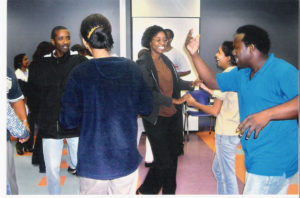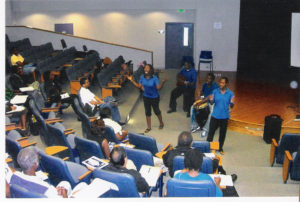
TACT is an introductory course to the teaching philosophy and strategies contained in Dr. Dani Lyndersay’s Educative Theatre (DCFA, UWI). It positions the arts as not only a useful tool in effective teaching… but a necessary one.
TACT recognises that educators are the foundation stones of civilization and thus, it is very important that society works with them to ensure their success. Teaching is seen as a vocation which has at its core our overall development.
TACT looks at the teacher as a facilitator of what is termed a Critical Pedagogy (Paulo Freire & Donaldo Macedo 2003) which not only teaches students about the facts of the world, but also enables them to initiate effective change when it is needed.
TACT offers the world of the arts to the Caribbean teacher, to assist them in opening significant portals to development within the classroom space. It promotes a dialectical learning environment, with the understanding that the experiences and perspectives of both the teacher and the student, are crucial to a complete education.
Lyndersay points out that the arts are an essential component of a complete education because:
- They are systems of communication and teach us about human interaction …
- They demand creativity in problem-solving and teach us about coping and growing …
- They challenge our perception and teach us to sense and interpret the world around us …
- They bring us pleasure and teach us to enjoy both learning and living …
Abraham H. Maslow, in his book The Farther Reaches of Human Nature (1971) had this to say about the arts: “In this realm of intrinsic learning, intrinsic teaching, and intrinsic education I think the arts are so close to our psychological and biological core … that rather than think of these courses as a sort of whipped or luxury cream, they must become basic experience in education.” (178)

Dorothy Heathcote (UK), an award-winning educator and drama-in-education pioneer, in her Collected Writings on Education and Drama (1991) also remarked: “It seems sensible to me that, if there is a way of making the world simpler and more understandable to children, why not use it? Dramatizing makes it possible to isolate an event or to compare one event with another, to look at events that have happened to other people in other places and times perhaps, or to look at one’s own experience after the event, within the safety of knowing that just at this moment it is not really happening. We can however feel that it is happening because drama uses the same rules we find in life.”
TACT– Introducing the Arts.
How?
- Hands-on, Practical Training.
- Discussion.
- Demonstrations.
- Group-work
What?
- The use of Games & analogies.
- Theatre Games
- Music Arts Strategies
- Visual Arts Strategies
- Carnival Arts
- Role-Playing & the Teacher-in-Role.
- Working with Roles.
Also…
- Sample Lesson Plans.
- Guidance on creating Useful tools- Tool boxes, Morgues for drama sessions.
- Resource cites and reading material.
Note: All strategies are taught with real curricula targets in mind…

